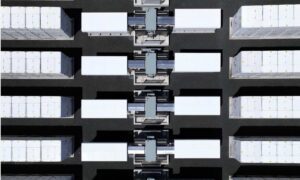Origin Energy has ridden the wave of high wholesale electricity prices and increasing demand for gas and coal power, to deliver an underlying profit of $550 million for the year ending June 30 2017, a 51 per cent jump on FY 2016.
In a results statement delivered on Wednesday morning, Origin said its earnings had been well supported by its retail energy portfolio, consisting mostly of gas power generation, plus the Eraring coal plant in New South Wales, and 732MW of installed renewables generation.
Origin said its energy markets division had locked in a 12 per cent increase in earnings before tax, to $1,492 million for the year to June 30, and buoyed investor hopes with an even better outlook for FY 2018, predicting growth in the region of 14-21 per cent.
The company also cut debt by $1 billion, and declared no final dividend for 2016-17, a decision chairman Gordon Cairns said was “not taken lightly” but in light of the board’s primary focus on reducing debt.
Speaking at a media briefing after the results announcement, Origin CEO Frank Calabria conceded that the 2017 energy market had been characterised by the “very well commented on and very critical” issue of high power price, which he said had been caused by the withdrawal of large, old coal-fired power stations, high demand over the summer period, and not enough new generation brought online.
“Clearly we haven’t had enough new supply added,” Calabria said, mirroring the recent comments of AGL Energy chief, Andy Vesey.
Calabria reaffirmed the company’s plans to help remedy that situation by investing in a lot more renewables, particularly as large-scale wind and solar continue to reduce in cost.
“PPA prices are coming down, we certainly have seen that trend over time, so you’d expect that to continue,” Calabria said, adding that he expected there was “a little bit more to go in solar than in wind.”
On solar thermal – which has been thrust onto the radar this week by SolarReserve’s winning tender to supply the South Australian government’s energy needs with a 150MW solar tower and molten salt storage plant in Port Augusta – Calabria said it was technology that was still expensive, and at this stage was “just another example of suite of technologies that will be supporting the market.
“We have looked at solar thermal from time to time,” he added. “We don’t have an aversion to it. We’re just assessing the market and making our best decisions.”
Among its key achievements, Origin listed the 1200MW increase in committed renewable energy supply, which it has built up through a series of market-leading power purchase agreements. And the company plans to keep adding to its renewables portfolio – hopefully, Calabria says, with the added market security of a Clean Energy Target.
Interestingly – and despite the company’s profit from exorbitant electricity prices, and despite the fact that, as David Leitch points out, the retailer lost electricity customers across the year – Origin also noted an improvement in customer satisfaction.
But Calabria was keen to stress that the gen-tailer was well aware of customer pain caused by high power prices, and on board with both the federal government and the Victorian state government’s call for reform in the retail sector.
“We’re aware that rising energy prices are hurting many Australian households and businesses. We’re helping those in hardship by making sure they will not pay the recent price increases and ensuring they are on our best offer with no conditions attached. We’re also behind the push to simplify energy and help customers more easily compare offers,” he said in a media statement on Wednesday.
“Bringing energy prices down will require a whole of industry response, including networks, generators and retailers. Origin is taking action to put downwards pressure on prices by increasing our supply of low-cost renewables to more than 25 per cent of our generation mix within three years, and boosting generation from Eraring.”
In comments at the media briefing, this was reiterated.
“What’s clear is that prices can’t continue to go up. That would be bad for everyone,” Calabria said, hinting at the threat of retail pricing regulation raised by this week’s Victorian review of the retail electricity market.
“What’s important is that you get the investment in new supply by Origin and others,” he said. “That’s the important balance we’re striving for. …The Victorian review pointed to what they think could be done better in the retail market.
“It goes to transparency of communication, transparency of choice. We’re supportive of all of that. We certainly don’t think regulation would be in the best interests of (the) market, but I understand that governments are struggling with this decision.”










